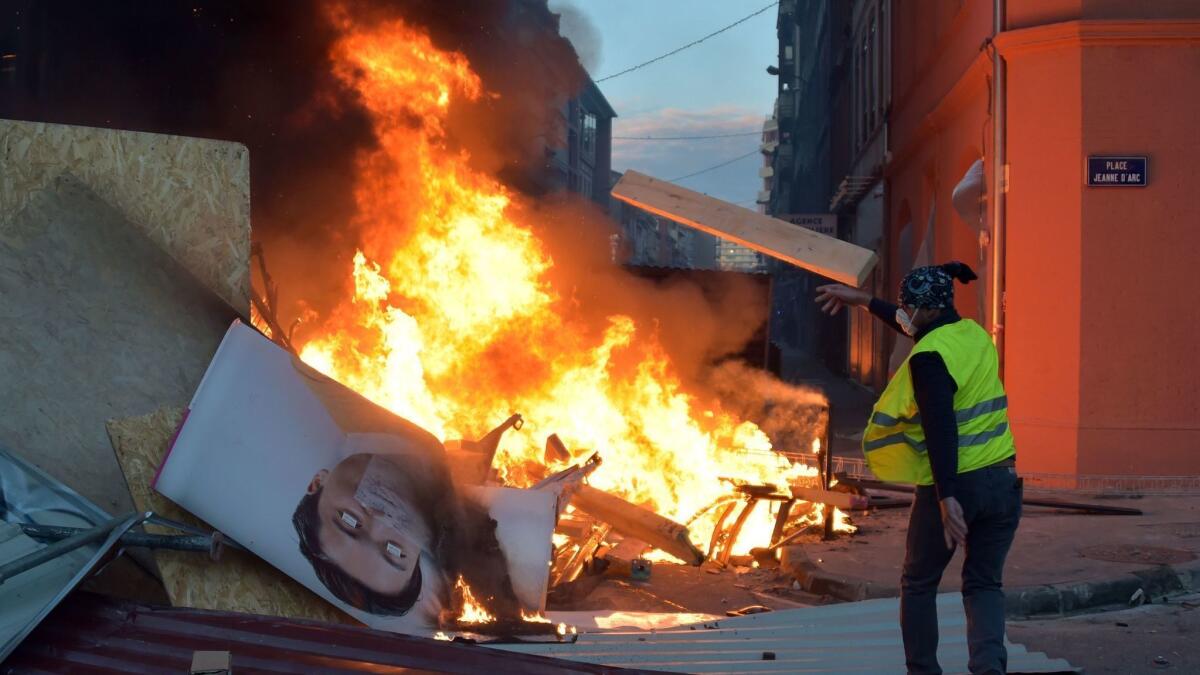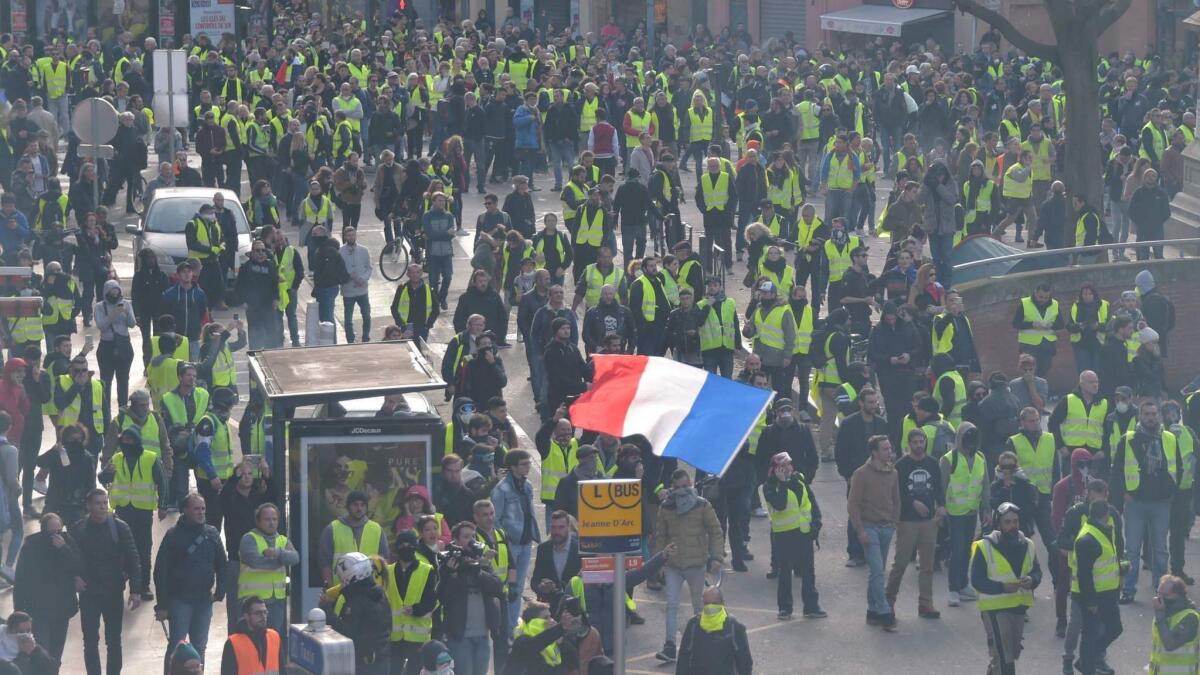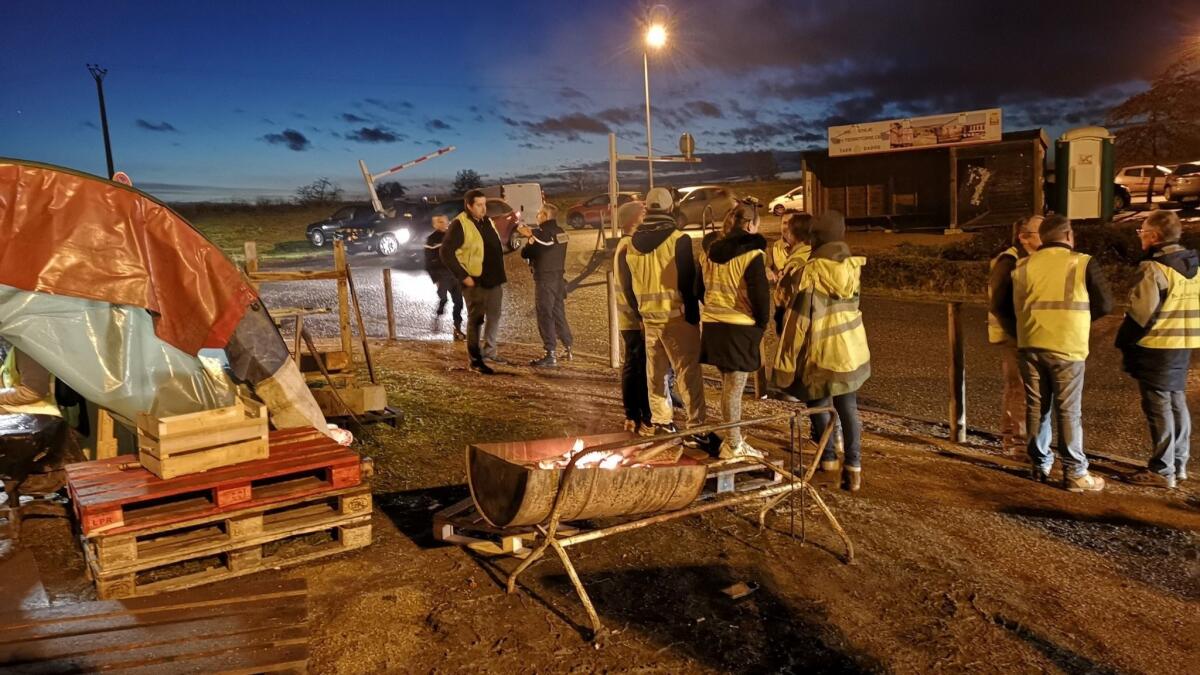The ‘yellow vest’ protests in France aren’t limited to Paris — they’re tapping into deep anxiety nationwide

- Share via
Reporting from Toulouse, France — Over the weekend, international attention was drawn to the streets of Paris, where thousands of marchers clashed with police and fires burned for hours in one of the biggest challenges yet to President Emmanuel Macron.
Yet Paris remains just part of a much broader story. Some of the greatest anger against a planned diesel fuel tax increase has come from the French provinces, where Macron is seen as an urbanite who favors the rich and lacks understanding of rural France.
France’s interior minister estimated that 136,000 people had marched or taken part in protests across the country over the weekend. In the southwestern city of Toulouse, the protests left 57 injured, including 48 police officers. Further east along France’s coast, a driver was killed in the town of Arles after his van hit a barrier put in place by protesters. In Narbonne, demonstrators set fire to a toll booth.

Even in Paris, prosecutor Remy Heitz said that most of the 378 people arrested over the weekend had come from provinces outside the capital.
The Gilets Jaunes, or Yellow Vests, movement, in which protesters wear the bright vests that drivers are required to keep in their cars at all times, started initially as a reaction to the planned tax on diesel fuel set to take effect in January as part of Macron’s efforts to fight climate change.
Rural residents who are more dependent on their cars for work and daily life say the tax will fall disproportionately on their backs. But the movement also tapped into a broader anxiety bubbling across regions of the country far from Paris. And given the deep-seated, underlying issues, simply addressing the gas tax no longer seems like it will be enough to resolve the tension.
Facing the gravest crisis of his 18-month presidency, Macron returned Sunday from the Group of 20 economic summit in Argentina, toured the damage, and asked his prime minister to hold a series of emergency meetings with leaders of all the other major political parties and representatives of the Yellow Vests movement, which has no formal organization.
On Monday, there was no sense of any return to normalcy. Vinci, a private company that contracts to manage many of France’s highways in the southern part of the country, was still publishing a long list of blockages throughout its networks that included at least 70 protest sites, some of which cut off access to major roads. Meanwhile, even some high school students staged walkouts in sympathy.
The uprising has proved confounding because it was not organized by a recognized group. While the French are accustomed to strikes, typically they are called by a major union or political party, and then there is often plenty of warning. When French railway employees went on strike for three months last summer, they published a calendar of strike dates so travelers could plan accordingly.
In contrast, the Yellow Vests’ protest has felt more like an uprising, even as some unions have issued words of support and solidarity, adding to the sense of uncertainty and foreboding. Yet signs of the rupture have been there for years.
According to statistics from INSEE, the government’s statistics and research wing, about 60% of French residents now live in big cities that comprise 7% of the nation’s land. In contrast, rural France covers 70% of the territory, but only has 23% of the population, a percentage that continues to decline. The rest live in some range of extended suburbs.
For those in the countryside, the numbers of stores, post offices, doctors and jobs continue to slide, leaving people even more dependent on their vehicles, according to INSEE.
To some degree, the anger that has bubbled up in recent weeks reflects tension in a country where culture, politics and the economy are highly centralized in Paris. The rural-urban divide has become even wider over the last decade, as evidenced in the most recent presidential election. Macron won the second round of voting with 66%, but much of the 34% received by far-right National Front candidate Marine Le Pen came from hard-hit rural areas.
A landslide for his party in the legislative elections emboldened Macron to push through work and tax reforms at breakneck speed.
Even as Macron’s popularity plummeted to 27% in recent weeks, opposition parties felt powerless. And people who increasingly saw the former investment banker as the “president of the rich,” felt there was no way to make their voices heard.
The gas tax seemed to symbolize this disconnect. From the perspective of rural residents, while Macron was using his crusade against climate change to raise his international profile, he wasn’t thinking about the average person when crafting policies. This led to what has become one of the movement’s rallying cries: “They talk about the end of the world and we are talking about the end of the month.”
On Monday evening, Claudine Rivals gathered near a highway exit with about 30 other protesters just outside the town of Gaillac. Rivals had spent almost her whole life in this rural southwestern region, known for its wine and flowers. She worked most recently as a florist, but was forced to stop for health reasons and has been living on a fixed income for several years.

But while her income has remained flat, the cost of just about everything else continues to go up. She had long given up on politicians to help, and didn’t even vote in the last election. But when she heard about a couple of Yellow Vests protests over the gas hike, she put out a call on Facebook for people to assemble in her area and was surprised when hundreds turned out the first weekend.
“This is not a political party and it’s not the unions,” she said. “It’s the people who are shouting and it’s the people who are angry.”
Having seized the public’s attention and brought public life to a grinding halt, the Yellow Vests movement faces its own challenges. It has maintained public support in polls, despite the incidents of violence. But as the government seeks to negotiate, the movement has no clear leaders. And beyond rollback of the gas tax, its demands and agenda are unclear.
In Toulouse, a man named Benjamin Cauchy declared himself the spokesman for the local Yellow Vests protesters, and began appearing on TV and radio shows looking every bit an establishment figure in his coat and tie. When local protesters began insisting that they had never heard of him, and had no idea who he was, he abruptly “resigned” and declared he was starting his own organization called Les Citrons (The Lemons).
Both Le Pen and Jean Luc Mélenchon, a far-left politician who was eliminated in the first round of presidential voting this year, have rallied to the Yellow Vests’ cause. “We are in a situation that is almost insurrectional,” Melenchon said in weekend interview on a French television station.
The pair have called for a vote of censure against Macron and for dissolving the National Assembly to allow for a new round of elections to let the French deliver a verdict on Macron before his term is scheduled to end in three and a half years.
Leaders of regional governments, where the Socialist Party still retains a fair bit of power, have taken a different tack. Carole Delga, president of the region of Occitanie, had already been pursuing policies around improving purchasing powers for residents of her southern territory, which includes Toulouse and Montpellier. That has included negotiating lower prices for local trains, and financial support for educational supplies.
Delga, whose support remains above 60% in regional polls, was one of 15 regional presidents to sign an open letter to Macron last week, calling him to recognize the problems of those in the Yellow Vets movement, and to take more direct steps to help them economically.
“It would be a very serious mistake to caricature their revolt as an extremist movement manipulated by the ultra-right or the ultra-left,” the letter said. “The movement of ‘yellow vests’ is the living expression of the fracture territorial and social in our country. It captures the anger of our fellow citizens.”
O’Brien is a special correspondent.
More to Read
Sign up for Essential California
The most important California stories and recommendations in your inbox every morning.
You may occasionally receive promotional content from the Los Angeles Times.











